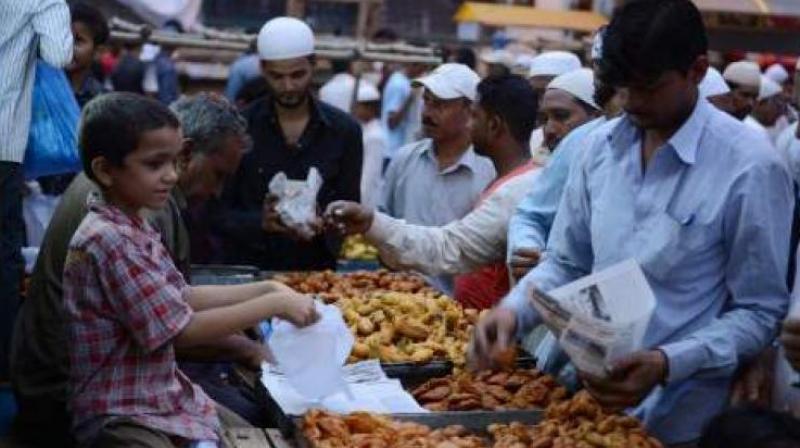Dec 15, 2016
FSSAI to revise food labelling norms

Highlighting the steps taken to tackle malnutrition in India, Agarwal said the regulator has come out with fortification standards and many firms have shown interest.
NEW DELHI: Food Safety and Standards Authority (FSSAI) is revising food labelling norms and examining global models, its CEO Pawan Kumar Agarwal said.
"Our labelling provisions are currently under revision. We are looking at Codex norms. We are going beyond that to see our labelling norms are robust," Agarwal said.
He was speaking at the launch of 'India Spotlight Index 2016' published by the Netherlands-based NGO The Access to Nutrition Foundation (ATNF).
FSSAI will also look at best global practices as far as regulations are concerns, he added.
Highlighting the steps taken to tackle malnutrition in India, Agarwal said the regulator has come out with fortification standards and many firms have shown interest.
"The government is committed to address issues related to malnutrition head on. Fortification is one amongst the initiatives being taken to address malnutrition," he said.
While fortification has been made mandatory in some areas, in many areas, particularly in packaged food, it is not feasible, he noted.
Talking about the index, the FSSAI chief said, "Those areas where it cannot be made mandatory and where you cannot directly intervene to ensure more nutritious food, this kind of index can be critical."
The findings of the index, which has assessed 14 companies, is "fairly known and do not throw out any major surprises. But this at least focused attention on desirable expectation from food businesses," he said.
"We will use this report to nudge the rest of the food businesses. In the area of nutrition, the role of the government is primarily to nudge citizens to adopt good nutrition practices. At the same time, the food businesses should manufacture and supply nutrition-rich food in the market. Otherwise, citizens will not have choices," he added.
The key finding of the index, ATNF Executive Director Inge Kauer said, is that the "largest food and beverages manufacturers in India are falling far short of what they need to do in help fight the enduring and mounting double burden of malnutrition."
The 10 companies assessed in the index are Amul, Britannia Industries, Coca-Cola India, Mondelez India, Mother Dairy, Nestle India, Parle Products, PepsiCo India, Ruchi Soya and Hindustan Unilever. Four more firms -- Adani, Cargill, ITC Ltd and Nandini -- were also interviewed.
The index has assessed the nutritional quality of their products and their nutrition related policies.
On product profiling, the FSSAI chief said that "a company may have good corporate profile but if its product file is not having high nutritional values, it is not really helpful."
Most food and beverage products across the globe do not have high nutrition value and this kind of index will help nudge such companies, he said, and asked ATNF to assess more companies in the next 2018 report to get a better picture.
Keventer bananas ‘safe’

KOLKATA: Most of the bananas , available in the local markets, are ripened either with Calcium Carbide or Ethephon , which are very harmful for health, even may lead to cancer as both the chemicals are carcinogenic. Identification of safe bananas from the market has become very difficult for the common people.
To solve this problem, the largest organised business company in the fruit frozen food markets, Keventer has taken initiative for supplying bananas ripened with 'Ethylene', which is approved by Food Safety Standard Authority of India (FSSAI), a recognised body of the government, as the best method for ripening bananas which causes no harm to health . Needless to mention, safety in all its food products is the core value proposition of Keventer.
Banana is very helpful for health. According to medical practitioners, banana should be taken by the people every day, as it has Vitamin 'C' and potassium. .Doctors explained that banana contains vitamin C, which helps grow immunization and protect from incurable inflammatory bowel disease respectively. This has been jointly discovered by Indio-American medical scientists. It is a myth that the children cannot be given banana during their cough & cold, Doctors added.
Keventer, one of the largest organized player in bananas, sell about 3.5 lakh pieces daily i.e. about 50 metric tonnes bananas every day all over Bengal from its two centres, located in Barasat, near Kolkata and Siliguri.
Their ripening centre at Barasat was constructed with an expenditure of about Rs.50 crores and the Siliguri Centre was built with Rs 104 crores. From Barasat centre, they supply bananas mainly to Kolkata, Midnapore, Durgapur and other markets. Siliguri, Darjeeling, Jalpaiguri, Gangtak and other markets are served from their Siliguri Centre.
Keventer is the market- leader by a wide margin , i.e. at least 3 (three) times even from their nearest competitor. They procure about 20,000 tonnes of bananas annually from Nadia, North and South 24 Parganas, Murshidabad and Hooghly districts, about 50,000 farmers are directly benefitted with their business. It may be mentioned here that due to association with Keventer , the realisation of bananas from the farmers has gone up by at least 30-40% during the last 5 years.
To help the customers, so that they can easily identify the safe bananas in the market, Keventer brands its bananas with the Stickers and also has a mascot, named "Keven". Their stickers are range from the functional (highlighting the carbide -free aspect) to the fun (with different appearances of mascots at the time of Pujas, Sports etc.).
‘Food, beverage firms need to improve nutritional quality of products in India’

Kamal NarangPawan Kumar Agarwal, CEO, FSSAI, and Inge Kauer, CEO, Access to Nutrition Foundation, at the launch of the Access To Nutrition-India Spotlight Index, in New Delhi on Wednesday
Access to Nutrition Foundation unveils index to nudge companies to provide healthy products
NEW DELHI, DECEMBER 14:
Food and beverage manufacturers in India need to put in a lot of effort to improve the nutritional quality of their products to combat malnutrition in India, according to Access to Nutrition Foundation, which launched India Access to Nutrition Spotlight Index here on Wednesday, based on an product analysis of the 10 key players in the sector in India.
As per a report by the Netherlands-based non-profit organisation: “Only 12 per cent of the beverages and 16 per cent of the foods sold by these companies were estimated to be of high nutritional quality in the product profile analysis.”
Based on the total sales in 2014, the 10 food and beverage manufacturers selected for assessment for the index included Amul (GCMMF), Britannia Industries, Coca-Cola India, Mondelez India, Mother Dairy, Nestle India, Parle Products, PepsiCo India, Ruchi Soya Industries and Hindustan Unilever.
Inge Kauer, Executive Director, Access to Nutrition Foundation, said: “India faces the serious and escalating double burden of malnutrition, with a large undernourished population as well as growing numbers of overweight and obese people who are developing chronic diseases. Food and Beverage (F&B) manufacturers in India have the potential, and the responsibility, to be part of the solution to this double burden of malnutrition.”Selling healty products
The study ranked Mother Dairy, Hindustan Unilever, Amul and Britannia Industries as the top four companies that sell the largest proportion of healthy products. The product profile score assessment was based on the nutritional quality of products weighted by retail sales.
On the corporate profile score, which assesses the companies’ nutrition commitments, practices and disclosure, Nestle India, Hindustan Unilever, PepsiCo India, and Mondelez India ranked among the top four.
The report said while nine of these companies had made commitments to combat under-nutrition, most companies either did not produce or produce very few fortified packaged foods.Fortification standards
Speaking at the launch of the index, Food Safety and Standards Authority of India CEO Pawan Kumar Agarwal said the government was committed to address issues related to malnutrition and the regulator had recently come out with fortification standards for staples.“Fortification can be made mandatory in some areas but in many areas making it mandatory is not feasible,” he added.
On a query regarding making companies more accountable for product labels, Agarwal said the regulator was examining Codex norms and the labelling norms were currently under revision, adding that the regulator would look at the best global practices.
Food must not be packed in newspapers
Printing inks, colours and impurities harmful to health.

Nutritionists back a warning given by the Food Safety and Standards Authority of India (FSSAI) that food must not be packed in newspapers.
Hyderabad: Nutritionists back a warning given by the Food Safety and Standards Authority of India (FSSAI) that food must not be packed in newspapers. Packing in or serving food on newspaper could be hazardous to health. The FSSAI has warned that eating such food could cause slow-poisoning because of cancer causing agents and microbes in newsprint and directed Commissioners of Food Safety in all states to launch awareness drives and discourage street vendors from packing cooked foods in newspapers.
On its website, the FSSAI has said, “Wrapping food in newspapers is an unhealthy practice. Consuming such food is injurious to health even if it has been cooked in a hygienic atmosphere.” Senior nutritionist Madhu Lata said, “Newspapers have printing inks and harmful colours, pigments, binders, additives and preservatives. These can have an effect on the body. It is harmful for a person to regularly consume food supplied in newspapers. Often, mirchi bhaji, samosa, idli, vada and other snacks are delivered in newspapers. Even if they are clean and healthy in preparation, the packaging makes them harmful.”
The presence of pathogenic micro-organisms is also a cause of concern since the newspapers go through various channels before reaching the vendor and hence poses a potential risk to human health. Another nutritionist, S Usha, said, “The increasing problems of the digestive track like indigestion, ill-effects on endocrine system and deficiency of vitamin B 12 are linked to presence of chemicals in the body. What foods we have and how we take it are important.
Food firms slow in addressing nutrition crisis: study
Only around 12% of beverages and 16% of food items sold by companies that Access to Nutrition Foundation studies are of high nutritional value

The India Access to Nutrition Spotlight Index 2016, a study by Netherlands-based Access to Nutrition Foundation, noted that while some of the largest food and beverages companies in India have made strategic commitments to grow businesses with focus on health and nutrition, the industry as a whole is moving very slow in addressing nutrition challenges in India.
New Delhi: India’s largest food and drink companies are far from the fight against obesity and malnutrition, a new report said.
The India Access to Nutrition Spotlight Index 2016, a study by Netherlands-based Access to Nutrition Foundation (ATNF) released on Wednesday, noted that while some of the largest food and beverages companies in India have made strategic commitments to grow businesses with focus on health and nutrition, the industry as a whole is moving very slow in addressing nutrition challenges in India, which is “home to the world’s largest number of stunted children”.
The study, which scores leading multinational firms on corporate strategy, availability of appropriate, affordable and accessible products, and positive influence on consumer choice and behaviour, studied top 10 food and beverages companies in India, including the multinationals.
Nestle India Ltd topped the ranking with a score of 7.1 out of 10 in overall terms, followed by Hindustan Unilever (6.7). ATNF studied 7 companies for the listing.
In terms of product profile, Mother Dairy topped the list with a score of 5.6 out of 10, followed by Hindustan Unilever (4.6) and Amul (4.4).
According to the study, only around 12% of beverages and 16% of food items sold by companies that ATNF studies are of high nutritional value. Domestic companies need to adopt and disclose their nutrition strategies and policies, while multinationals need to improve the nutritional quality of their portfolios, the ATNF study added.
“India faces the serious and escalating double burden of malnutrition, with a large undernourished population as well as growing numbers of overweight and obese people who are developing chronic diseases. Food and beverages manufacturers in India have the potential and the responsibility to be part of the solution to this double burden of malnutrition,” said Inge Kauer, executive director, ATNF.
According to the National Family Health Survey (2005-06) conducted by ministry of health & family welfare, government of India, 42.5% children under 5 years of age are underweight and 48% are stunted.
The ATNF report suggested the government should enable and encourage food and beverages companies to introduce fortified packaged products to address “specific widespread micronutrient deficiencies”, and should use more fortified staple ingredients compulsory in government programmes, such as mid-day meal schemes in schools.
The country’s food regulator Food Safety and Standards Authority of India has already proposed making fortified food mandatory for public food programmes, including public distribution scheme (PDS), mid-day meals and other schemes such as integrated child development services (ICDS) scheme and scheme for adolescent girls.
“We are in discussions with various ministries and industry and working on setting up standards and how to make large-scale food fortification a reality,” said Pawan Kumar Agarwal, chief executive officer, FSSAI, who officially released the ATNF report on Wednesday.
Patanjali fined Rs 11 lakh for misleading ads
- A Haridwar court imposed fine of Rs 11 lakh on Yoga guru Ramdev's company, Patanjali Ayurved Ltd.
- Fine was imposed on charges of misbranding and misrepresentation of its products.

HARIDWAR: A fine of Rs 11 lakh has been imposed on Yoga guru Ramdev's company, Patanjali Ayurved Ltd, by a city court on charges of misbranding and misrepresentation of its products.
In its order, the court of Lalit Narain Mishra, Haridwar's additional district magistrate, found the company, which is currently eyeing at doubling its revenues from the current Rs 5,000 crore to almost Rs 10,000 crore by the next financial year, guilty of "releasing misleading advertisements by selling certain products with its labels although they were being manufactured by some other firm."
Citing Section 52 (misbranding) and Section 53 (misleading advertisement) of the Food Safety and Standards Act, 2006 as well as Section 23.1 (5) of Food Safety and Standard (Packaging and Labelling Regulations, 2011) Act, it ordered Patanjali to pay the fine within a month. It also directed the district food safety department to "take appropriate action if there is no improvement in the products in future."
A case against the company was filed at the ADM's court in November 2012 after samples of products, including honey, salt, mustard oil, jam and besan (gram flour) picked up for sampling on August 16, 2012, allegedly failed quality tests.
The tests were conducted at Uttarakhand's only FSSAI-certified drugs and food testing lab located at Rudrapur. The case had been ongoing ever since. The order regarding the fine imposed on the company was given by the court on December 1, but became public a day ago.
Watin manufacturing bakeries to be banned, says FSOs
IMPHAL, Dec 14 : After five bakeries located at Kakwa Laiphrakpam Leikai were reportedly found violating food safety norms in manufacturing Watin, local name for gram flour Bhujia, Food Safety Officers today said that the bakeries will be banned from manufacturing any edible items.
Food Safety Officers including M DInesh, Th Nelson and P Nongallei of Imphal West district today conducted a drive at bakeries lcoated at Laiphrakpam Leikai (Pukhri Maning) wherein Sushila Bakery Kakwa Watin, Thoibi Bakery Kakwa Watin, Memchouba Bakery and Selungba Kakwa Watin were found violating the norms under Food Safety Standard Act in manufacturing various food items like Watin, Bhujia, Namkeen and Khajur.
The officers informed that the team had inspected the bakeries on October 14.
The bakery owners were also instructed to adhere to the food safety norms and obtain licences under the Food Safety and Standards Act, 2006.
The food packets have no information like the manufacturing date and expiry date. The bakery owners have failed to pay heed to the instruction. If the same continues, the five bakeries will be banned.
The team informed that shopkeepers have been accepting such food items to earn profit. However, one must not forget that consuming food items that have no information given on the food packets can cause major health problems.
Subscribe to:
Posts (Atom)



